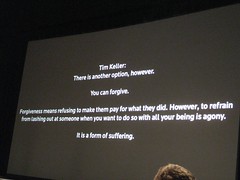Sorry it has taken a while to post the second half of this post (and there’s so much more to do), but it seems some of my drafts got lost. I must not have uploaded them properly to WordPress.
Here are my notes from the second half of NT Wright’s first lecture (Friday night 4.16.10). Read at your own risk though, I may not have heard it all correctly and he is a bit of a wordsmith so keep that in mind. This is for the skimmers who don’t have time to listen to the complete audio. This is also intended for newbies who are curious about NT Wright’s work but have not been able to read much. I suggest that you read a few books of his before passing a verdict.
Enjoy.
—–
It’s the western church that he has invented another Jesus and put it on top of the cannon.
(A Non-canonical Jesus)
The Traditional Church has invented Jesus’ and substitute of the cannon
When we read the canonical gospels (all 4, he inserted. For those who don’t get that, Jesus and the Victory of God only uses the Synoptics, Matthew, Mark & Luke) they are not through the identity of Jesus but through Jesus’ inauguration of the Kingdom of God.
The message bringer has been screened out the inaugural of God’s kingdom – forgetting what he was saying heaven on earth as it is in heaven.
The cannon was trying to say this (the inaugural of the Kingdom)
The Gospel does not say Jesus is divine, though He is. They are saying Jesus is bringing the kingdom. (This part confused me a bit and will need to re-listen and try to understand. Confusing bc I thought it was both. Of course I would, I love plurality).
His humanness was his Jewishness.
He mentioned that the Council of Chalcedon de-Judahizing (he tends to make up words) Jesus and Israel.
Jesus is Israel’s God coming to his kingdom and to his world.
Much more powerful than simply saying Jesus is God.
(he did miracles, said great things. … reading through the Bible you will see many people doing amazing things but it does not mean they are God. They may not be divine).
We need to retrieve the canonical Jesus of Israel.
It matters because this stuff actually happened once.
If you don’t have the historical rootedeness , you will turn the message of Jesus into your own version of the truth – how you can have a particular spirituality.
We shrink the story of God and of Israel
We shrink the power of the cross (or the kingdom).
Many churches are kingdom churches but don’t know what the cross is there for.
And many churches that are cross churches that don’t know what the kingdom is there for.
Some people say odd things about Jesus like,
“What a shame his career was cut short .. he was a roll with that stuff.” haha
Some atonement theologies do not affirm the establishment of the kingdom of God on earth as it is in heaven.
It’s not that Jesus was just walking around doing stuff aimlessly and the evangelists were the brilliant theologians adding value and brilliance to it.
Jesus was the brilliant innovator, the disciples were the witnesses doing their best to describe it. Anything else should be counter-intuitive.
Jesus is both sovereign and vulnerable.
There is not directly the proof of Jesus.
It first demonstrates that He is Israel’s Messiah.
Do not short circuit the Israel dimension
Which means his death is the messianic death
He was doing the messianic thing that had enslaved Israel
Resurrection means a new creation.
Jesus is raised bodily from the dead, therefore he is the Messiah, therefore God’s new creation has been launched.
It is not that we just have a future heaven.
Jesus has been raised from the dead, a new creation has begun, and therefore we have a job to do (proclamation).
When Jesus wanted to convey the Kingdom he didn’t give them a theory, he gave them a meal.
Frustration with Barth is that he does not allow any natural theology.
It only works in a closed charm system. No point of contact outside of it.
No point of connection with reality.
Thus, Paul should have even bothered with the Areopagus (Acts 17)
We need to be transformed by the resurrected Jesus
There is an epistemological bridge
For Thomas
For Peter. Each time he asks Peter if he loves him, he uses a lesser intimate word. Jesus comes to Peter on his level.
For us.
 While I have always been a bit unsettled by “Christian celebrity”, I find Don to not have let his success get the best of him. It did bother me that there was a charge for the book tour but I’m guessing that’s a publisher trying to recoup costs. And in fairness, him and his team are traveling for 3 months. All in all, I do like the concept of the book tour. While I’m probably less inclined to pay money to hear most authors, I guess Don is among those I would. In any case, I do appreciate these moments as they often help me appreciate the book more. It was a great night. I’m glad I went. I even bought the book again and asked Don to write a note to my wife who was too pregnant to attend. In fact, she’s too pregnant to travel, sit, sleep, eat, breath but baby boy is coming Monday. It’s foreordained. Btw, my few moments with Don was very warm.
While I have always been a bit unsettled by “Christian celebrity”, I find Don to not have let his success get the best of him. It did bother me that there was a charge for the book tour but I’m guessing that’s a publisher trying to recoup costs. And in fairness, him and his team are traveling for 3 months. All in all, I do like the concept of the book tour. While I’m probably less inclined to pay money to hear most authors, I guess Don is among those I would. In any case, I do appreciate these moments as they often help me appreciate the book more. It was a great night. I’m glad I went. I even bought the book again and asked Don to write a note to my wife who was too pregnant to attend. In fact, she’s too pregnant to travel, sit, sleep, eat, breath but baby boy is coming Monday. It’s foreordained. Btw, my few moments with Don was very warm. 1. Are all those tables in the Resource Tent necessary? Honestly, some of them mock our faith more than help it. I know it helps offset the costs of the event but is it substantial? Unless they are serving as an example of what artists like Derek Webb are singing against, I’m fairly certain that if Jesus were to return on Labor Day weekend, He would first stop at this tent, overthrow half these tables and then continue on to that East Gate in Jerusalem that He’s supposed to walk through ;-)
1. Are all those tables in the Resource Tent necessary? Honestly, some of them mock our faith more than help it. I know it helps offset the costs of the event but is it substantial? Unless they are serving as an example of what artists like Derek Webb are singing against, I’m fairly certain that if Jesus were to return on Labor Day weekend, He would first stop at this tent, overthrow half these tables and then continue on to that East Gate in Jerusalem that He’s supposed to walk through ;-) blogs. He told him that people were saying that Rob was heretical and the messages were full of fluff and irrelevance. “But I defended you.”
blogs. He told him that people were saying that Rob was heretical and the messages were full of fluff and irrelevance. “But I defended you.” “You are not an ecclesial punching bag hired to take the blows. You are a collective resource.”
“You are not an ecclesial punching bag hired to take the blows. You are a collective resource.”






Recent Comments